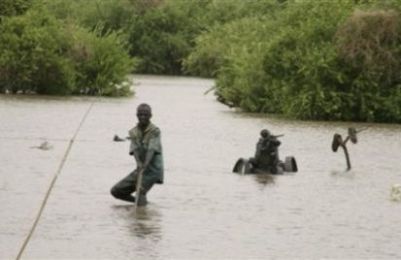Sudan to host tripartite Nile basin meeting
March 1, 2015 (KHARTOUM) – The Sudanese capital of Khartoum will host on Tuesday the meetings of the Ministers of Foreign Affairs and Water Resources of the three countries of the east Nile Basin countries which include Egypt, Sudan and Ethiopia for discussions on outstanding issues related to the Ethiopian Renaissance dam project.

The three previous meetings held in Khartoum and Addis Ababa have failed to reach an agreement on Egyptian reservations related to the dam.
The ministers of irrigation and water in these three countries signed last September an agreement to form a committee of national experts to bridge gaps in views of Ethiopian renaissance.
The Egyptian foreign minister Samih Shoukri along with the minister of water resources Hussam Maghazi arrived on Monday evening to participate in the meetings which will address the political and technical aspects of the dam.
The Egyptian ambassador in Sudan Osama Shaltout said in press statements on Sunday that the purpose of the meetings is to reach results that would bring about mutual benefits to all parties without harming any side.
Egypt fears that the construction of the 4.3 billion dollar dam project will diminish its water share which is a source of water to millions people of the desert nation.
Up on completion by 2017, the Grand Ethiopian renaissance dam will have electricity generating capacity of 6,000 megawatt.
Currently the power plant project which will be Africa’s largest is 36% completed and will take the east African nation up to six years to fill the dam’s 74 billion cubic-meter reservoir.
For his part, Ethiopia’s minister of Water and Energy Alemayehu Tegenu stressed that his country will not seek permission from anyone to construct the dams, adding that the Renaissance dam is being built on the course of the Blue Nile but would not harm Egypt’s water share.
Tegenu went on to say that Ethiopia will not provide written guarantees to Egypt or any other country, adding that the construction of the dam is a sovereign decision and a national project for the purposes of development through electric power generation.
“I would like to emphasize that Ethiopia is a sovereign state and will not wait for permission from anyone to build dams and development projects on tributaries of the Nile River, and we reiterate that this dam will not cause any harm to the interests of others,” Tegenu said in an interview with Turkey-based Anadolu news agency.
“Our battle is against poverty, hunger and thirst, and we seek to illuminate every house in Ethiopia, as well as provide potable water supply, and this is the wish of all Ethiopians”, appealing to both Egypt and Sudan to sign the Entebbe Agreement and work for the unity of the Nile Basin countries.
Five Nile Basin countries members including Ethiopia, Kenya, Uganda, Rwanda and Tanzania signed the Entebbe Agreement which seeks to re-allocate the Nile water shares contrary to colonial agreements on this matter.
Following the signing of Entebbe Agreement in 2010, Egypt and Sudan, who own over 85 percent of the river waters according to the colonial-era treaty, froze their activities in the Nile Basin Initiative (NBI). Egypt resumed its participation last month at a meeting in Khartoum.
(ST)
